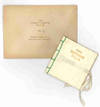

The History of Liquor Licensing Principally from 1700 to 1830 : English Local Government Volume 11
by Sidney and Beatrice Webb
- New
- Hardcover
- first
- Condition
- BRAND NEW/BRAND NEW
- Seller
-
Peter Tavy, United Kingdom
Payment Methods Accepted
About This Item
London: Frank Cass and Co Limited, 1963. Leaving aside the early manorial and municipal regulations, the Webs take up their subject with the introduction of national measures at the close of the 15th-century. They show that the regulation of traffic, from the first, was not based on any abstract theory, but on the practical necessities of the state. The legislators dealt with liquor traffic as an enemy of social peace. But these efforts were constantly thwarted by its value as a source of revenue, and the governmental policy of encouraging the great brewing and distilling industries. Under James 1 an elaborate system of strict control was developed, but at the end of the 17th century a General laxness set in and justices began to the neglect their duty. Drunkenness increase enormously and the government encouraged the liquor industry by several favorable statutes. The ensuing excesses caused a reaction and in 1729 and 1736 parliament adopted a strong restrictive policy of high license and heavy taxation on the retail trade. This was followed by another period of parliamentary laxness and an increase in drunkenness and depravity, which itself caused a reaction in the next reform movement, initiated in 1786 /87 by a royal proclamation. The number of licenses were so reduced that the anti-monopolist led a successful campaign, resulting in the beer act of 1830. The effect was instantaneous; in less than six months. 24,342 new beer shops were opened, with an inevitable increasing crime and social disorder. At this point, the Webs close their research, but they append a general survey of legislation up to the end of the 19th century. 176 pp, including index A FINE (As UNREAD) COPY. This book will be POSTED AT OUR STANDARD RATES FULLY INSURED (UK) ONLY . Please email for further details Please Email for further details or Direct Enquiries Tel : 01822 810108. . NOT Inscribed or Signed. 1963 Reprint of the 1903 1st Editio. Dark Green Cloth. BRAND NEW/BRAND NEW. Illus. by Not Illustrated. 8vo - over 7¾" - 9¾". HARDBACK.
Reviews
(Log in or Create an Account first!)
Details
- Bookseller
- Bookfarm
(GB)
- Bookseller's Inventory #
- 013705
- Title
- The History of Liquor Licensing Principally from 1700 to 1830 : English Local Government Volume 11
- Author
- Sidney and Beatrice Webb
- Illustrator
- Not Illustrated
- Format/Binding
- Hardcover
- Book Condition
- New BRAND NEW
- Jacket Condition
- BRAND NEW
- Edition
- 1963 Reprint of the 1903 1st Editio
- Publisher
- Frank Cass and Co Limited
- Place of Publication
- London
- Date Published
- 1963
- Bookseller catalogs
- Social History; Local History; Research; A CASS;
- Size
- 8vo - over 7¾" - 9¾"
Terms of Sale
Bookfarm
Returns accepted within 30 days if book fails to meet description.
About the Seller
Bookfarm
Biblio member since 2004
Peter Tavy
About Bookfarm
Former bricks and mortar stores now wholly online
Glossary
Some terminology that may be used in this description includes:
- Cloth
- "Cloth-bound" generally refers to a hardcover book with cloth covering the outside of the book covers. The cloth is stretched...
- Reprint
- Any printing of a book which follows the original edition. By definition, a reprint is not a first edition.
- Inscribed
- When a book is described as being inscribed, it indicates that a short note written by the author or a previous owner has been...
- New
- A new book is a book previously not circulated to a buyer. Although a new book is typically free of any faults or defects, "new"...
- Fine
- A book in fine condition exhibits no flaws. A fine condition book closely approaches As New condition, but may lack the...


